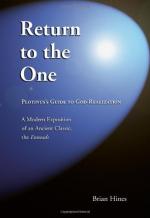|
This section contains 15,171 words (approx. 51 pages at 300 words per page) |

|
SOURCE: “Plotinus on the Nature of Eternity and Time,” in Aristotle in Late Antiquity, edited by Lawrence P. Schrenk, The Catholic University of America Press, 1994, pp. 22-53.
In the following essay, Strange analyzes how, in Ennead 3.7, Plotinus attempts to overcome problems concerning eternity and time.
Plotinus's treatise on eternity and time, Ennead 3.7 in Porphyry's edition of his master's works, has been among the most widely read of his treatises, not only due to its intrinsic philosophical interest and historical importance, but also because it is one of the most accessible and self-contained of Plotinus's writings. Unlike most of Plotinus's treatises, Ennead 3.7 does not at first seem to presuppose on the part of the reader either an extensive knowledge of the inner workings of Plotinus's metaphysical system or an intimate familiarity with specific issues of scholastic controversy in the first centuries a.d. It takes the form of a...
|
This section contains 15,171 words (approx. 51 pages at 300 words per page) |

|


